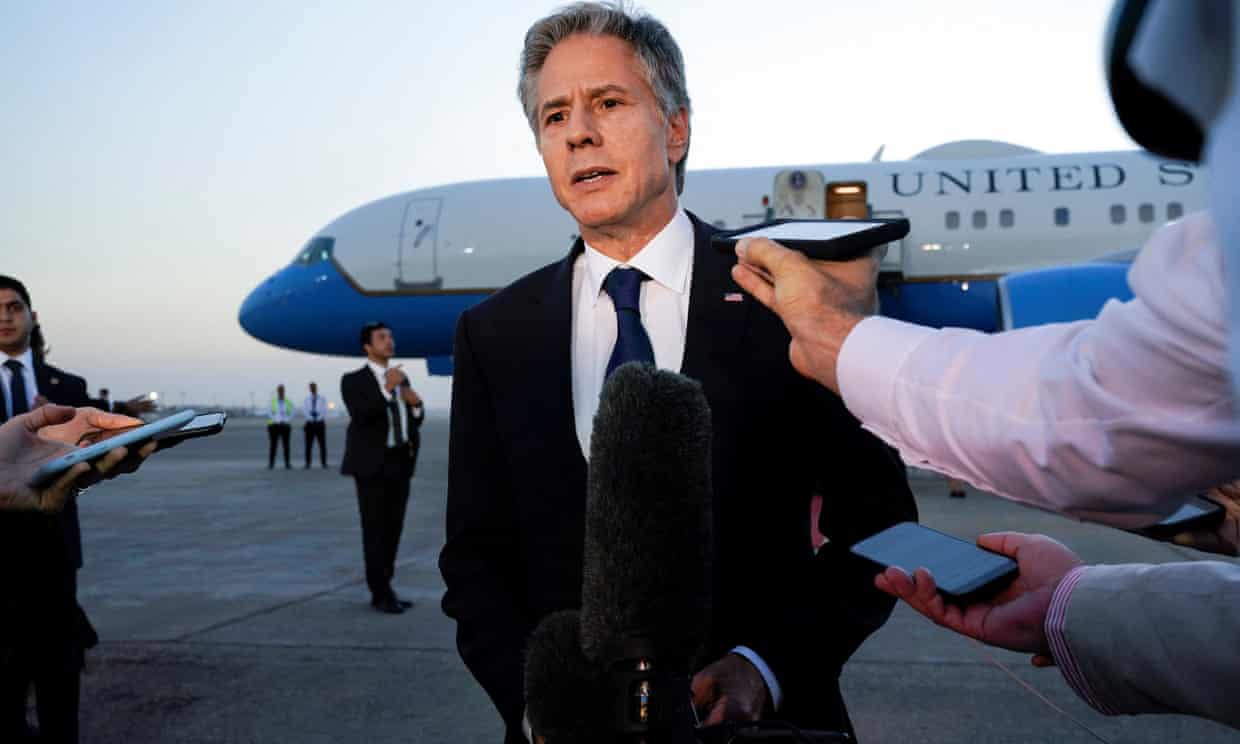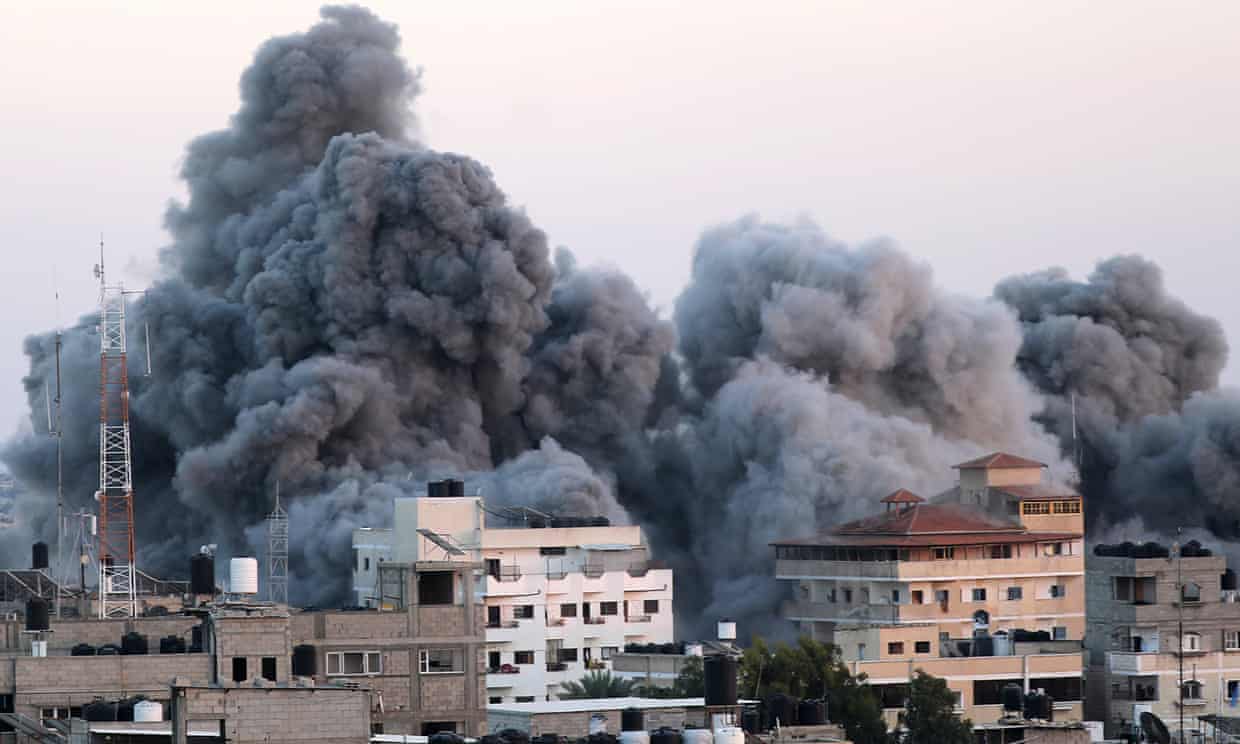US is concerned heavy Palestinian casualties caused by expected ground assault will provoke Iran and inflame wider tensions
Patrick Wintour, Ruth Michaelson and Bethan McKernan in Jerusalem
A last-ditch attempt to reduce the impact of a potentially catastrophic all-out Israeli land assault on Gaza will be made by the US secretary of state, Antony Blinken, amid fears that the already daunting Palestinian death toll will rise and provoke an intervention by Iran or its proxies.
He will return to Jerusalem for a second round of talks in five days with the Israeli prime minister, Benjamin Netanyahu on Monday, ending a whirlwind round of shuttle diplomacy designed to stop the conflict spreading. In a sign of the tensions, Iran’s foreign minister, Hossein Amir-Abdollahian, warned on Sunday: “If the Zionist aggressions do not stop, the hands of all parties in the region are on the trigger.”
“No one can guarantee the control of the situation and the non-expansion of the conflicts” if Israel sends its soldiers into Gaza, he added.
A second US aircraft carrier group has been deployed to the Mediterranean for what was described by the US defence secretary, Lloyd Austin, as deterring “hostile actions against Israel or any efforts toward widening this war”.
Blinken has been working on a plan for safe spaces for Palestinian civilians inside Gaza and on its borders and, in the first sign that Israel may listen to private US entreaties, Israeli officials said they were restoring limited water supplies to southern Gaza, amid a wider water crisis, after a call between Biden and Netanyahu. After a meeting with the Egyptian president, Abdel Fattah al-Sisi, Blinken said the Rafah crossing between Egypt and Gaza would reopen to allow aid in and the evacuation of some foreign passport holders.

Few diplomats, however, expect Israel to abandon an incursion designed to “demolish Hamas” after its assault on Israel that has left at least 1,300 dead and 126 held hostage, including children, foreign nationals and a veteran peace activist.
More than 600,000 Gazans have so far moved to the southern part of the territory near the Egyptian border city of al-Arish, before an expected Israeli ground offensive. International aid workers in Gaza described an unprecedented situation of “humanitarian collapse”.
In Israel, Netanyahu on Sunday convened the first meeting of Israel’s expanded emergency war cabinet at a military headquarters in Tel Aviv, declaring: “Hamas thought we would be demolished. It is we who will demolish Hamas.”
Israeli is massing troops close to Gaza and has said it will use air and sea assets in any attack on Hamas in the territory.
Israel has been warned by the UN and almost all Arab leaders that an full-scale Israeli assault in response to the horrific attack by Hamas eight days ago may lead to multiple casualties, breach humanitarian law and deepen the divisions across the Middle East. The Palestinian death toll from the Israeli bombardment now stands at 2,670, according to Gaza officials.
Blinken spent Sunday in separate talks with Saudi Crown Prince Mohammed bin Salman and with Sisi in Cairo.
The secretary of state was given a stiff televised lecture by Sisi warning him that Israel’s bombardment was disproportionate. “The reaction went beyond the right to self-defence, turning into collective punishment for 2.3 million people in Gaza,” al-Sisi said of Israel’s retaliatory strikes for Hamas militants’ attacks a week ago.
He added: “What happened nine days ago was, needless to say, difficult and we, again needless to say, condemn it. But we must also realise the existence of a state of hatred and anger that has accumulated over 40 years because there was no prospect for a solution of the Palestinian question that will give Palestinians hope. We are making an effort to contain the situation and prevent other parties joining the conflict.”
He was speaking after a meeting of Egypt’s national security council agreed to reject Israel’s “displacement policy and attempts to finish the Palestinian cause at the expense of its neighbours”. Egypt is stepping up its military presence at its Rafah border crossing with Gaza after Israel on Friday told civilians living in the north of the territory they had 24 hours to evacuate to the south.
Egypt fears that Israel will try to push millions of Palestinians over the border into the Sinai desert leaving Egypt indefinitely responsible for hundreds of thousands of refugees – and risking bankrupting the country’s ailing economy. Cairo is also fighting its own Islamist insurgency in the Sinai peninsula.
Palestinians themselves, and other Arab states, fear refugees would never be allowed back to their homes.
Israel’s leaders have not spelled out their long-term plan for Palestinian refugees, but some former diplomats said Egypt would need to build “tent cities” for refugees in the desert. Danny Ayalon, a former Israeli ambassador to the US, said Egypt should take people temporarily. “There is a huge expanse, almost endless space in the Sinai desert just on the other side of Gaza,” he said.
Israeli diplomats deny their goal is to expel Palestinians from Gaza as they fight Hamas, although the defence minister, Yoav Gallant, has said the plan is to “eliminate everything”. Another minister, Gideon Sa’ar, has said Gaza “must be smaller at the end of the war”.
The Israeli energy minister, Israel Katz, denied the decision to allow water supplies to parts of the south of the territory was a concession, posting on social media that it would “result in pushing the civilian population to the south of the Gaza Strip and will make it possible to tighten the general siege on Gaza in the areas of electricity, water and fuel”.
Repeating a message that he has been making with increasing force through his five-day tour, Blinken said Washington will ensure “Israel has what it needs to effectively defend itself”, but added: “The way Israel does this matters … it needs to do it in a way that affirms the shared values we have, for human life, for human dignity.”
Blinken, in common with European politicians, had been urging Sisi to open the Rafah border crossing from Gaza into Egypt at least to allow some foreign nationals and badly wounded Palestinians to cross the border to receive treatment. More than 9,600 people inside Gaza have been injured, according to Palestinian health authorities.
The Egyptian president had for four days turned down western pleas to open the border, saying he would only do so for priority cases, including foreigners, if Israel allows aid convoys to enter Gaza. The Egyptian foreign minister, Sameh Shoukry, blamed Israel for the impasse in an interview with CNN, saying: “The border crossing was bombed [by Israel]. The Palestinian side is not in a position to receive vehicles.” He said Egypt was prepared to admit foreign nationals with the right paperwork, and in conjunction with foreign embassies.
Egypt signed a peace treaty with Israel in 1979 after decades of conflict, and the two countries maintain full diplomatic relations.
In a sign that Egypt is making preparations to receive some refugees, the northern Sinai governor, Gen Mohamed Abdel-Fadil Shousha, lifted a state of emergency that had been in place for years in light of security tensions between the army and Islamist groups in the region.
He directed “all local authorities to list schools, housing units and vacant land to be used as shelters if required” in anticipation of a wave of Palestinians fleeing the Israeli offensive. The camps are being prepared at Sheikh Zuweid and Rafah, as are government buildings, including schools and headquarters, that can be used as shelters. The camps would be guarded by the Egyptian army. An armed uprising spread in northern Sinai after the military overthrew President Mohamed Morsi of the Muslim Brotherhood in 2013.
Egypt, Turkey and the United Arab Emirates have contributed to an aid convoy of 143 trucks for use by the UN relief agency for Palestinian refugees (Unrwa) that are waiting to go into Gaza, but the main crossing remains closed. Local hospitals are also being prepared for the wounded.
Blinken has also appointed David Satterfield, a former US diplomat with extensive experience in the Middle East, to spearhead US efforts at coordinating the delivery of humanitarian aid into Gaza via the Rafah border crossing. Satterfield was given the title US special envoy for Middle East humanitarian issues.
The US Congress recently withheld US aid money because of Egypt’s human rights record under Sisi, but there will be pressure to lift those restrictions if Egypt lets in refugees.
